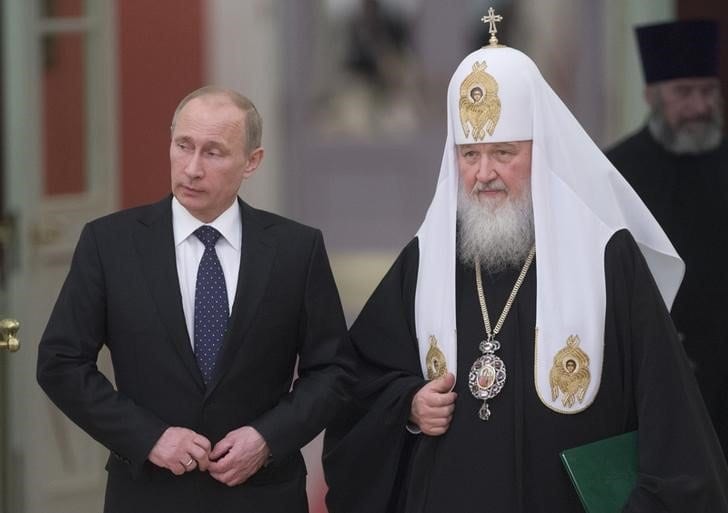By John L. Allen Jr., Crux Now
ROME – Let’s make one thing clear at the outset: It takes a special kind of chutzpah for the Patriarch of Moscow to complain that his bishops and clergy are being subjected to pressure, intimidation and even “persecution” from the state in today’s Ukraine.
Patriarch Kirill of Moscow recently made precisely that appeal in letters to Pope Francis, Archbishop Justin Welby of Canterbury, the World Council of Churches, the Secretary General of the UN and the governments of France and Germany, and pretty much anyone else who might listen. The content of the letters was released through official Russian news channels.
He wrote that “the interference of the heads of the secular Ukrainian state in ecclesiastical affairs has recently assumed the form of excessive pressure exercised on the bishops and priests of the Ukrainian Orthodox church [which is what Moscow calls the branch of the Russian Orthodox church in Ukraine loyal to Moscow], which permits me to speak of the beginning of a persecution on a large scale.”
“The numerous acts of discrimination to which the Ukrainian church has already been subjected makes us fear even graver violations of human rights and of the freedom of Orthodox Christians, who are guilty only of remaining loyal to canonical Orthodoxy,” Kirill wrote.
So far, there has been no public reaction on the part of Pope Francis or the Vatican.
Kirill made the appeal on the eve of Saturday’s opening of a “Council of Unification” in Ukraine, the object of which is to end the division among three separate branches of Orthodoxy in the country and set the stage for recognition of a new, independent Orthodox church in Ukraine in early December by the Patriarch of Constantinople.
To put such an appeal into context for Americans, it’s a bit like the leaders of the defeated confederacy writing to the president of the United States complaining that their former officers were subject to racial discrimination in the south in the aftermath of the Civil War.
In reality, no one’s ever used the tools of the state to impose religious obedience in Ukraine more brutally or thoroughly than the Russians. During the Soviet era, fealty to the Patriarch of Moscow was imposed down the barrel of a gun, rendering, among others, the Greek Catholic Church in the country the world’s largest illegal religious body.
In percentage terms, no church in the world suffered more martyrs during the Soviet era than the Greek Catholics, though Orthodox believers in Ukraine who defied Russian control were heavily persecuted as well.
It’s therefore more than a little difficult to take the Russians seriously today when they posture as victims, given their bloody history.
However, like anyone else who’s ever take a freshman logic class, I’m also familiar with the tu quoquoe fallacy: The mere fact that someone’s a hypocrite doesn’t make them wrong.
It’s true that Ukrainian President Petro Poroshenko has backed the drive for the independence of the Orthodox church in Ukraine from Moscow, reportedly spending more than a half-million Euro to pay for propaganda campaigns and pro-independence organizing. He’s also dispatched security services into Moscow-affiliated churches in Ukraine, subjecting pastors to interrogations and accusing them of various sorts of threats against national security and of inciting “religious hatred.”
At times, the harassment has been remarkable petty. On Dec. 9, for instance, Ukrainian border agents denied entry into the country to Metropolitan Hilarion of Donetsk, who’s a member of the Russian-affiliated Orthodox church, even though he’s a Ukrainian citizen and routinely moves back and forth between Russia and Ukraine.
Poroshenko’s aim is to be able to position himself as the man who engineered a definitive religious break with Moscow in Ukraine’s national elections on March 31, 2019, the outcome of which at the moment appears uncertain.
In all honesty, those efforts may actually backfire. Many of the Russian Orthodox bishops and clergy were already not planning to participate in the “Council for Unification,” and it’s unlikely that the appearance of heavy-handed state intimidation is going to win friends and influence people.
The “Council for Unification’s” main job is to elect a leader for a newly independent Orthodox church, who would then travel to Istanbul to receive the tomos, the formal document granting independence to the church, from Patriarch Bartholomew of Constantinople on Jan. 6, which is Christmas eve on the Orthodox calendar.
From the beginning, Bartholomew has backed the independence drive in Ukraine, since Constantinople and Moscow have long been rivals for predominance in the Orthodox world. Should the bulk of global Orthodoxy gradually come to terms with the independence decree, the result could have geopolitical as well as ecclesiastical significance, because it would suddenly mean that the Russian Orthodox Church is no longer the 800-pound gorilla of Orthodox Christianity.
The Vatican has studiously stayed out of the fray, despite the fact that the Greek Catholic Church is broadly supportive of the independence campaign and that Francis clearly prefers Bartholomew as his privileged interlocutor in the Orthodox world. However, there’s no doubt that net-net, the Vatican’s global interests would probably be strengthened if the Patriarchate of Moscow’s stranglehold on the Orthodox world were weakened.
For decades, the greatest asset Christianity in Ukraine possessed was its moral authority as a church of martyrs, which was enough to fire imaginations and win sympathy all across the world.
It would be tragic if, now that Ukraine appears to be on the brink of finally achieving a hard-won degree of independence, that achievement were to be marred by perceptions that it, too, was achieved with the help of force and political collusion.









